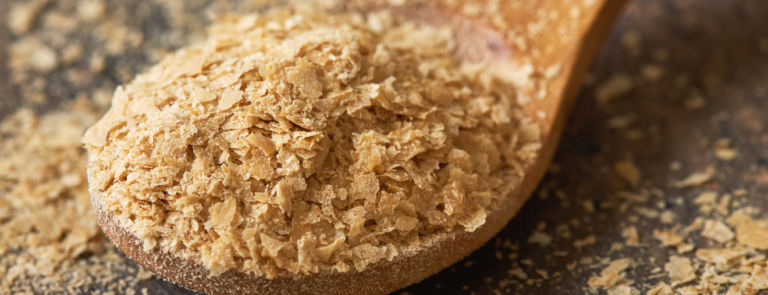15% off €35 or 20% off €45
8 nutritional yeast benefits & 5 uses

Summary
1What is nutritional yeast made out of?
Yeast, part of the funghi family, is produced from molasses, a natural sugar syrup. When molasses and oxygen meet and are left to ferment, yeast is...
2What does nutritional yeast taste like?
The overriding flavour of nutritional yeast is a cheese-like taste. This cheesy, umami (one of the core five tastes) flavour makes it perfect for...
3What can you use nutritional yeast flakes for?
Here are few of our favourite ways how to use nutritional yeast. Sprinkle it over pasta or popcorn. Stir it into soup and sauces. Sub it for cheese...
What is nutritional yeast?
- Unfortified nutritional yeast: contains naturally-occurring vitamins and minerals produced by the yeast cells while they grow.
- Fortified nutritional yeast: contains the above + synthetic vitamins added to boost its nutritional value. This is the type you’re most likely to see in shops – more vitamins, why not?
What is nutritional yeast made out of?
Why is nutritional yeast popular?
What does nutritional yeast taste like?
Nutritional yeast nutrition
Nutritional yeast nutrition
| Fortified nutritional yeast calories | 17kcal |
| Fat | 0.2g |
| Carbohydrates | 1.9g |
| Of which sugars | 0.6g |
| Fibre | 1.1g |
| Protein | 2.6g |
| Vitamin B1 (thiamin) | 2.3mg |
| Vitamin B2 (riboflavin) | 0.9mg |
| Vitamin B3 (niacin) | 17.1mg |
| Vitamin B5 (pantothenic acid) | 7.0mg |
| Vitamin B6 (pyridoxine) | 1.7mg |
| Vitamin B7 (biotin) | 9.8mcg |
| Vitamin B9 (folic acid): | 220mcg |
| Vitamin B12 | 2.2mcg |
| Iron | 0.3mg |
| Zinc | 6.0mg7 |
What are the health benefits of nutritional yeast flakes?
What can you use nutritional yeast flakes for?
- Sprinkle it over pasta, toast, popcorn, salads, or any other food you would usually rate cheese over
- Stir it into soups, sauces, scrambles and stews for a unique umami, cheesy and nutty flavour, vegan white sauce anyone?
- Substitute it for your usual parmesan in pesto, pizza and ‘cheesy’ broccoli and cauliflower dishes
How to use nutritional yeast flakes

1. How to use nutritional yeast as cheese
2. How to use nutritional yeast in soup

3. How to use nutritional yeast in pasta
4. How to use nutritional yeast on pizza

5. How to use nutritional yeast on popcorn
10 nutritional yeast recipes
- Vegan Caesar Salad with Kale & Avocado
- Easy DIY Vegan Cheese Spread
- Vegan Fry-up
- Vegan Huevos Rancheros
- Green Veggie Frittata
- Vegan ‘Meatball’ Subs
- Broccoli, Spinach & Wheatgrass Soup
- Meat-free Pepperoni Pizza
- Mushroom & Pea Risotto
- Cheesy Spinach Pasta
The final say
You also asked...
No. Nutritional yeast can’t be used as a baking agent as it’s inactive and contains no leavening properties.
While nutritional yeast is suitable for most people to enjoy, those with a yeast allergy or sensitivity may want to avoid it.
Or if you have any other medical condition that may be affected by yeast, speak to a GP before adding it your diet.
Yes, most nutritional yeast is gluten free, like Engevita Yeast Flakes but you must check the label of other brands before you buy to make sure.
- http://www.thepermanentejournal.org/issues/2016/summer/6192-diet.html
- https://www.bbcgoodfood.com/glossary/nutritional-yeast-glossary
- https://www.vegansociety.com/resources/nutrition-and-health/nutrients/vitamin-b12/what-every-vegan-should-know-about-vitamin-b12
- https://www.credenceresearch.com/report/nutritional-yeast-market
- http://marigoldhealthfoods.co.uk/products/engevita/engevita-vitamin-d.php
- https://www.verywellfit.com/cheddar-cheese-nutrition-facts-and-health-benefits-4797454 /shop/product/engevita-yeast-flakes-b12-60009142
- https://fdc.nal.usda.gov/fdc-app.html#/food-details/1991802/nutrients
- https://www.ncbi.nlm.nih.gov/pmc/articles/PMC4772032/
- https://www.ncbi.nlm.nih.gov/pmc/articles/PMC7019700/
- https://www.uofmhealth.org/health-library/hw65706
- https://onlinelibrary.wiley.com/doi/abs/10.1111/j.1525-1470.2007.00385.x
- https://www.nhs.uk/live-well/eat-well/vegetarian-and-vegan-diets-q-and-a/
- https://fdc.nal.usda.gov/fdc-app.html#/food-details/1991802/nutrients
- https://vegfaqs.com/nutritional-yeast-amino-acid-profile/
- https://fdc.nal.usda.gov/fdc-app.html#/food-details/1991802/nutrients
- https://www.ncbi.nlm.nih.gov/pmc/articles/PMC1567081/
- https://link.springer.com/article/10.1007/BF00170199
- https://www.ncbi.nlm.nih.gov/pubmed/3521441
- https://www.ncbi.nlm.nih.gov/pubmed/12936943
- https://pubmed.ncbi.nlm.nih.gov/28872611/
- http://www.sciencedirect.com/science/article/pii/S1871141307001369
- http://www.sciencedirect.com/science/article/pii/S1871141307001369
- https://fdc.nal.usda.gov/fdc-app.html#/food-details/1991802/nutrients




